beethovens symphonies
Nine Approaches to Art and Ideas
martin geck
Translated by Stewart Spencer
The University of Chicago Press Chicago and London
The University of Chicago Press, Chicago 60637
The University of Chicago Press, Ltd., London
2017 by The University of Chicago
All rights reserved. No part of this book may be used or reproduced in any manner whatsoever without written permission, except in the case of brief quotations in critical articles and reviews. For more information, contact the University of Chicago Press, 1427 E. 60th St., Chicago, IL 60637.
Published 2017
Printed in the United States of America
26 25 24 23 22 21 20 19 18 17 1 2 3 4 5
ISBN-13: 978-0-226-45388-0 (cloth)
ISBN-13: 978-0-226-45391-0 (e-book)
DOI: 10.7208/chicago/9780226453910.001.0001
German Edition: Martin Geck, Die Sinfonien Beethovens. Neun Wege zum Ideenkunstwerk, Hildesheim 2015 Georg Olms Verlag AG, Hildesheim 2015, Germany
The translation of this work was supported by a grant from the Goethe-Institut, which is funded by the German Ministry of Foreign Affairs.

Library of Congress Cataloging-in-Publication Data
Names: Geck, Martin, author. | Spencer, Stewart, translator. | Translation of Geck, Martin. Sinfonien Beethovens.
Title: Beethovens symphonies : nine approaches to art and ideas / Martin Geck ; translated by Stewart Spencer.
Other titles: Sinfonien Beethovens. English
Description: Chicago : The University of Chicago Press, 2017. | Includes bibliographical references and index.
Identifiers: LCCN 2016041562 | ISBN 9780226453880 (cloth : alk. paper) | ISBN 9780226453910 (e-book)
Subjects: LCSH: Beethoven, Ludwig van, 17701827. Symphonies. | Beethoven, Ludwig van, 17701827Criticism and interpretation. | Symphony19th century.
Classification: LCC ML410.B42 G4413 2017 | DDC 784.2/184092dc23 LC record available at https://lccn.loc.gov/2016041562
 This paper meets the requirements of ANSI / NISO Z39.48-1992 (Permanence of Paper).
This paper meets the requirements of ANSI / NISO Z39.48-1992 (Permanence of Paper).
CONTENTS
Histrion vridique, je le fus de moi-mme! de celui que nul natteint en soi, except des moments de foudre et alors on lexpie de sa dure, comme dj. (I was the real actor playing myself! playing a truth that no one reaches in himself, except in moments of lightning and then one expiates them for their duration, as I have.)
STPHANE MALLARM
Villiers de lIsle-Adam
To keep the whole in view...
Flashes of lightning are a ubiquitous feature of Beethovens symphonies, throwing light on something that the composer merely suspected he was carrying around within him but which then found forceful and eruptive expression in his music. The years between 1800 and 1824 are not viewed as a separate or special period by historians, and yet they frame an exceptional age in music, for they encapsulate a world of ideas that Beethoven succeeded in conjuring up in his symphonies not only for himself but for others, too.
Perhaps he himself was already thinking on a historical scale when in his late twenties he introduced his First Symphony to the world in April 1800, marking the start of a new century and prompting Wolfgang Robert Griepenkerl to strike a rhapsodic note in his 1838 narrative Das Musikfest; oder, Die Beethovener (The music festival; or, The Beethovenians), which describes a particularly memorable passage in the opening movement of the Eroica (bars 24883) as thirty-six bars of pure nineteenth century. The piano Beethovens First Symphony marks the beginning of a new period in the history of the symphony and arguably also in the history of classical music in general. It will be worth our while, therefore, to examine the background to this radical upheaval within the world of music.
Within this context, two currents are of particular interest for our understanding of Beethovens art. Historians traditionally see them as a succession of two distinct periods, the Enlightenment and Romanticism. And yethere as elsewherethese periods overlap rather than moving from one to the other. Among the ideas associated with the Enlightenment is the belief that the individual discovered not only his or her dignity but also a sense of responsibility for what we would nowadays call the bigger picture. Until then there had been the widespread, essentially Christian belief that God is great, and man is small, and that the only great men were rulers and their agents, all of whom were acting at Gods behest. It was in this spirit that Bach wrote his Cantata BWV Anh. I 13, Willkommen, ihr herrschenden Gtter der Erden (Welcome, you ruling gods on Earth), for the Saxon royal family. Of course, mankind has always valued genuine human greatness, generally intellectual or artistic, but until the eighteenth century this was always seen as secondary. Only in the wake of the Enlightenment did it acquire its primary significance, bringing with it a new motto: Every rational person can advance society, and a person of genius can unhinge the world.
The Romantics contrasted this conviction with their own empirical observation that genius constantly comes up against its own limitations whenever its flights of fancy clash with contemptible everyday reality. Beethoven goes to the very heart of this contradiction: the victories that his symphonies celebrate are hard won or else they are invoked by means of resources available only to musicespecially his own.
In Beethovens eyes, his contemporary Napoleon Bonaparte was a man of genius, and there is no doubt that the composer identified with his hero throughout his entire life or at least judged himself by Napoleonic standardsand this remains the case even if Napoleons decision to have himself crowned emperor in 1804 left Beethoven feeling bewildered and disappointed. His admiration for the Corsican ruler rested not least on the fact that Napoleon had achieved his position of preeminence in Europe not through hereditary privilege but on the strength of his strategic genius, in the process championing fundamental social changes of an altogether revolutionary kind. It makes sense to examine Beethovens attitude to the Enlightenment through the filter of his admiration for Napoleon, for this particular perspective is by no means as one-sided as it may otherwise seem at first sight. It is an approach that brings us particularly close to Beethoven as a symphonist, for here we are dealing less with the Napoleon whom Beethoven acclaimed in 1820 as the protector of right and of the laws This recalls classical heroes such as Alexander the Great, with whom Beethoven is known to have identified, and it also means that Beethoven felt constantly stimulated to acquire a similar degree of fame by performing exceptional feats in the realm of music. (Quite how far Beethoven was capable of taking his identification with the figures of classical antiquity emerges from his attempts to gain custody of his nephew Karl, for in a court submission in 1818 he pointed out that Philip of Macedonia had taken charge of the education of his son, Alexander the Great, a right that Beethoven now claimed for himself in the case of his nephew.)
For Beethovenespecially as a symphonistthe concept of gloire is paramount because it radiates a far greater physicality than any ethical concept, making it an apt way of giving musical expression to such a notion and allowing Beethoven to pick up various traditions of vocal and instrumental music designed to glorify the state, starting with the official music of the French Revolution, and at the same time creating something new.

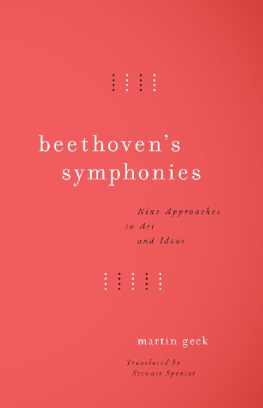
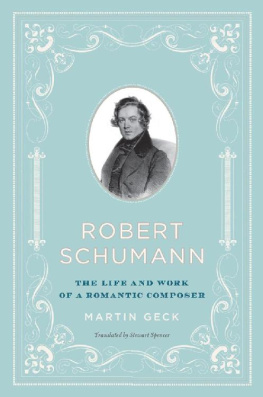
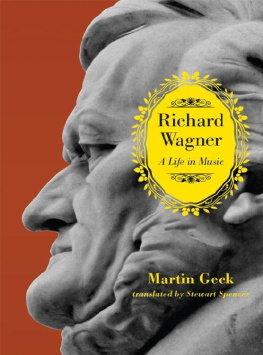
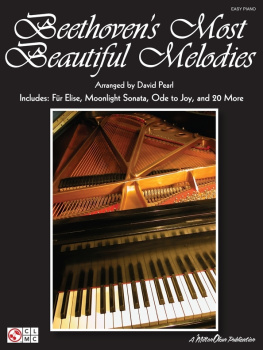
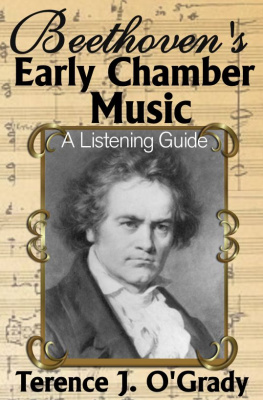
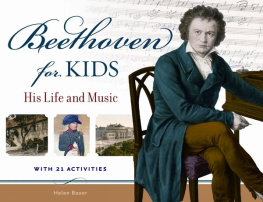
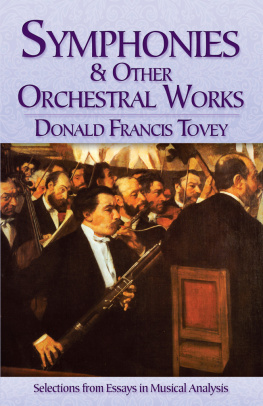

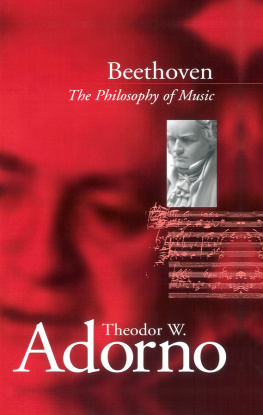
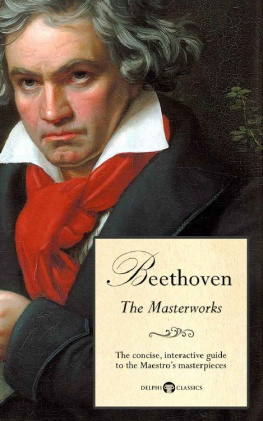
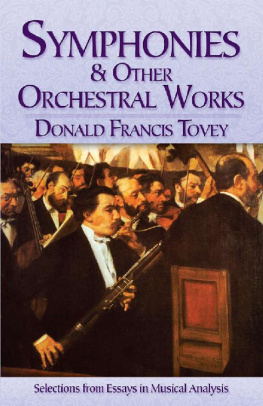
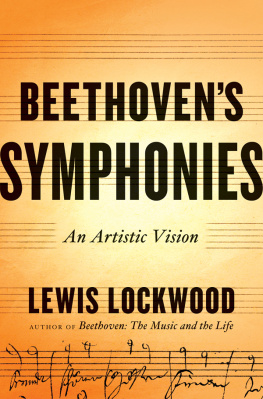
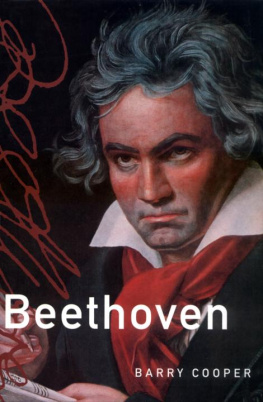


 This paper meets the requirements of ANSI / NISO Z39.48-1992 (Permanence of Paper).
This paper meets the requirements of ANSI / NISO Z39.48-1992 (Permanence of Paper).